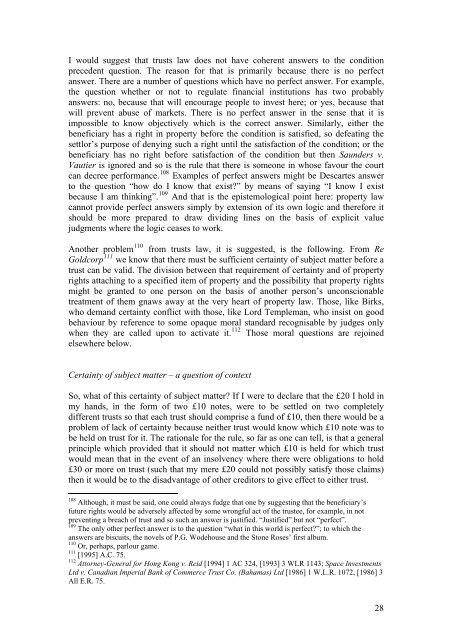The Unbearable Lightness of Property - alastairhudson.com
The Unbearable Lightness of Property - alastairhudson.com
The Unbearable Lightness of Property - alastairhudson.com
Create successful ePaper yourself
Turn your PDF publications into a flip-book with our unique Google optimized e-Paper software.
I would suggest that trusts law does not have coherent answers to the condition<br />
precedent question. <strong>The</strong> reason for that is primarily because there is no perfect<br />
answer. <strong>The</strong>re are a number <strong>of</strong> questions which have no perfect answer. For example,<br />
the question whether or not to regulate financial institutions has two probably<br />
answers: no, because that will encourage people to invest here; or yes, because that<br />
will prevent abuse <strong>of</strong> markets. <strong>The</strong>re is no perfect answer in the sense that it is<br />
impossible to know objectively which is the correct answer. Similarly, either the<br />
beneficiary has a right in property before the condition is satisfied, so defeating the<br />
settlor’s purpose <strong>of</strong> denying such a right until the satisfaction <strong>of</strong> the condition; or the<br />
beneficiary has no right before satisfaction <strong>of</strong> the condition but then Saunders v.<br />
Vautier is ignored and so is the rule that there is someone in whose favour the court<br />
can decree performance. 108 Examples <strong>of</strong> perfect answers might be Descartes answer<br />
to the question “how do I know that exist” by means <strong>of</strong> saying “I know I exist<br />
because I am thinking”. 109 And that is the epistemological point here: property law<br />
cannot provide perfect answers simply by extension <strong>of</strong> its own logic and therefore it<br />
should be more prepared to draw dividing lines on the basis <strong>of</strong> explicit value<br />
judgments where the logic ceases to work.<br />
Another problem 110 from trusts law, it is suggested, is the following. From Re<br />
Goldcorp 111 we know that there must be sufficient certainty <strong>of</strong> subject matter before a<br />
trust can be valid. <strong>The</strong> division between that requirement <strong>of</strong> certainty and <strong>of</strong> property<br />
rights attaching to a specified item <strong>of</strong> property and the possibility that property rights<br />
might be granted to one person on the basis <strong>of</strong> another person’s unconscionable<br />
treatment <strong>of</strong> them gnaws away at the very heart <strong>of</strong> property law. Those, like Birks,<br />
who demand certainty conflict with those, like Lord Templeman, who insist on good<br />
behaviour by reference to some opaque moral standard recognisable by judges only<br />
when they are called upon to activate it. 112 Those moral questions are rejoined<br />
elsewhere below.<br />
Certainty <strong>of</strong> subject matter – a question <strong>of</strong> context<br />
So, what <strong>of</strong> this certainty <strong>of</strong> subject matter If I were to declare that the £20 I hold in<br />
my hands, in the form <strong>of</strong> two £10 notes, were to be settled on two <strong>com</strong>pletely<br />
different trusts so that each trust should <strong>com</strong>prise a fund <strong>of</strong> £10, then there would be a<br />
problem <strong>of</strong> lack <strong>of</strong> certainty because neither trust would know which £10 note was to<br />
be held on trust for it. <strong>The</strong> rationale for the rule, so far as one can tell, is that a general<br />
principle which provided that it should not matter which £10 is held for which trust<br />
would mean that in the event <strong>of</strong> an insolvency where there were obligations to hold<br />
£30 or more on trust (such that my mere £20 could not possibly satisfy those claims)<br />
then it would be to the disadvantage <strong>of</strong> other creditors to give effect to either trust.<br />
108 Although, it must be said, one could always fudge that one by suggesting that the beneficiary’s<br />
future rights would be adversely affected by some wrongful act <strong>of</strong> the trustee, for example, in not<br />
preventing a breach <strong>of</strong> trust and so such an answer is justified. “Justified” but not “perfect”.<br />
109 <strong>The</strong> only other perfect answer is to the question “what in this world is perfect”; to which the<br />
answers are biscuits, the novels <strong>of</strong> P.G. Wodehouse and the Stone Roses’ first album.<br />
110 Or, perhaps, parlour game.<br />
111 [1995] A.C. 75.<br />
112 Attorney-General for Hong Kong v. Reid [1994] 1 AC 324, [1993] 3 WLR 1143; Space Investments<br />
Ltd v. Canadian Imperial Bank <strong>of</strong> Commerce Trust Co. (Bahamas) Ltd [1986] 1 W.L.R. 1072, [1986] 3<br />
All E.R. 75.<br />
28













